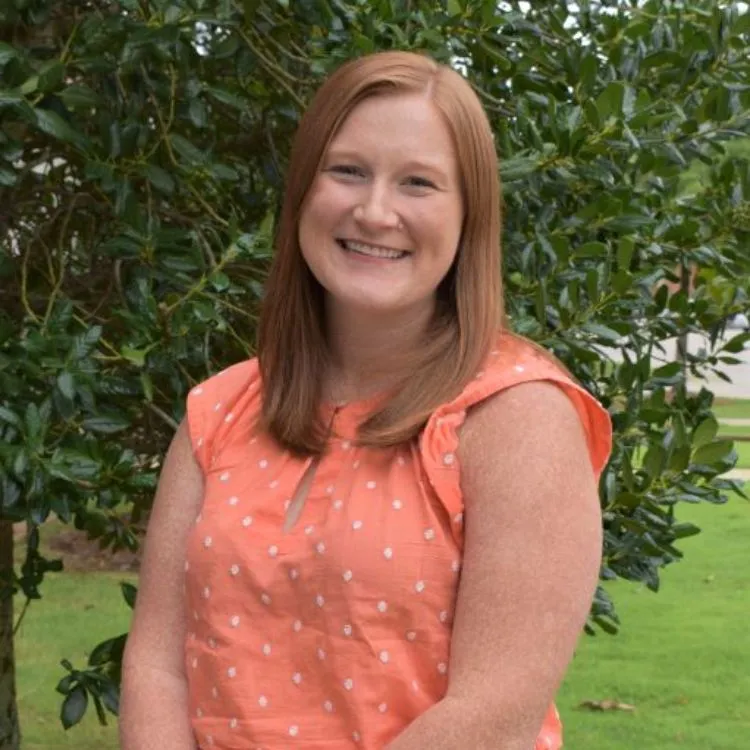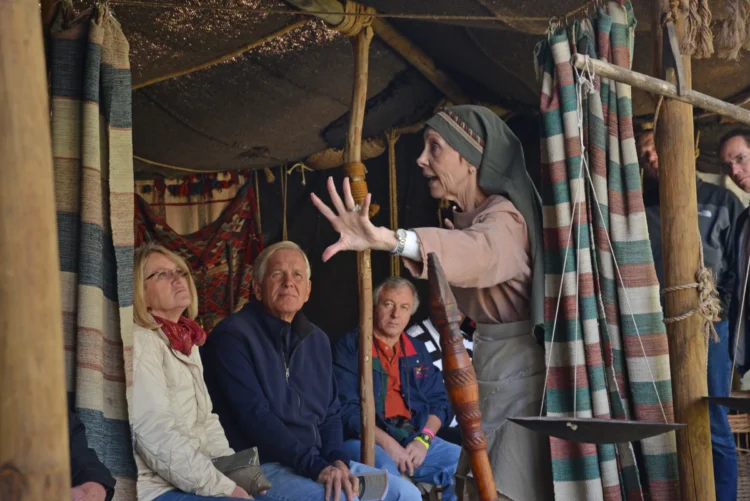
 Bethany Broderick, assistant professor of marketing, recently released her new book, Perfected: Trading Shame and Striving for Wholeness in Christ, which explores the question, “Am I good enough?” through a biblical lens. Below is an interview with her, where she shares the inspiration behind the book, how her personal journey shaped its message and what she hopes readers will take away from it.
Bethany Broderick, assistant professor of marketing, recently released her new book, Perfected: Trading Shame and Striving for Wholeness in Christ, which explores the question, “Am I good enough?” through a biblical lens. Below is an interview with her, where she shares the inspiration behind the book, how her personal journey shaped its message and what she hopes readers will take away from it.
What initially inspired you to write Perfected? Was there a particular moment or season in your life that made you feel this message needed to be shared in book form?
For the first two decades of my Christian life, I walked on eggshells around God. I checked off quiet times, served in church and followed all the “good Christian” rules — constantly glancing over my shoulder for His approval. I lived as though God were an angry father, demanding my good behavior before offering His affection. I wouldn’t have said that out loud, and for the most part, I was blind to those beliefs buried in my heart. But when I believed lies about who God was, I also believed lies about who He expected me to be.
What made it harder was the sense that I was alone in this struggle. I was overwhelmed by shame and striving, assuming everyone else had it together while I couldn’t keep myself from falling apart.
Over time — through Scripture, the kindness of mentors, and the work of the Holy Spirit — I began to identify the lies I’d been believing and replace them with truth. As I meditated on God’s character and promises, I finally started to experience freedom in Christ.
Writing became the way I processed it all — first through a blog, then on Instagram, and eventually through a newsletter. After many years, I finally wrote the book I wish I’d had 20 years ago — for the women who are still caught in the cycle of shame and striving, longing to know they are already perfected in Christ.
Were there any chapters or themes that were particularly difficult to write, either because of their emotional weight or theological complexity?
In the chapter on “Enduring Hope,” I write about a season of deep grief when my husband and I experienced a miscarriage and a delay in our adoption process. I had shared parts of these stories publicly before, but writing about how I processed that grief was incredibly vulnerable.
That season exposed a belief I hadn’t fully faced: that if I just did everything “right,” life would go according to plan. God used that pain to reveal how much of my hope was tied to my own good efforts, rather than to Christ alone. It was a difficult chapter to write, but I hope it brings comfort to others in seasons of suffering.
Did you have a specific reader in mind as you wrote — someone you were imagining sitting across from you as you told your story?
Absolutely. When I started sharing my writing online in 2019, I was surprised by how many women resonated with my story. Many had grown up in the church, knew all the right answers, and yet still felt trapped by shame and a constant pressure to measure up.
I prayed that by sharing my story and scriptural truths that helped me to work through these things, I would be able to help other women surrender their perfectionism and condemnation and walk in the freedom of Christ.
Were there any books, authors, or biblical texts that heavily influenced you during the writing process?
Definitely. I’m a voracious reader and loved being able to include footnotes throughout the book to point readers to other helpful resources. One that particularly impacted me was Enough About Me by Jen Oshman. It helped me name some of the subtle lies I’d been believing and articulate a more gospel-centered view of identity.
In your book, you discuss the pervasive question, “Am I good enough?” How did this question manifest in your own life, and what led you to explore it through a biblical lens?
That question has haunted me for as long as I can remember. It showed up in how I worked hard in school, how I navigated friendships, how I dated and even how I approached God. I was always chasing approval — whether from an inner critic, my peers or my family.
After getting married, a lot of the carefully curated image I had built began to crumble. It was in that season that God opened my eyes to the lies I was believing — about who He is and who I am. I began studying Scripture with fresh eyes, asking not just what God wanted from me, but what He had already done for me in Christ.
You highlight the contrast between cultural affirmations like “Just believe in yourself” and the deeper truths found in Scripture. How can believers discern between worldly encouragement and the gospel’s call to rest in Christ’s sufficiency?
Worldly affirmations always point us back to ourselves. While we are created with inherent dignity and worth, we’re not meant to be the source of our own identity or strength. When we look inward, we end up swinging between self-righteousness and self-condemnation.
The gospel invites us to look upward — to Christ. True encouragement is rooted in who God is, who we are in Him, and what Christ has already accomplished. That’s the kind of truth that lifts burdens rather than adds more.
Through your personal struggles with perfectionism and condemnation, you found freedom in trusting that Christ is enough. Could you share a pivotal moment or realization that marked a turning point in your journey?
I share this in the book, but during my first year of marriage, I was so overwhelmed by my sin and insecurity that I began to doubt my salvation. I wondered how God — or even my husband — could love me when I messed up so much.
I entered a spiral of shame and striving. I’d plead with God for forgiveness, then make promises to do better, withholding grace from myself until I felt I’d earned it. Night after night, I’d say a prayer of salvation, hoping that this time, it would finally “work.”
It wasn’t until I read Stop Asking Jesus Into Your Heart by J.D. Greear and began studying Romans 8 that I saw the truth: my security wasn’t found in my performance, but in Christ’s finished work. God didn’t save me so I could be “good enough” — He saved me so I could be His.
You discuss replacing “burdensome expectations” with the truth that Christ has perfected us. How can readers practically apply this truth in their daily lives to combat feelings of inadequacy?
It starts with identifying the lies we’re believing. When that wave of anxiety or dread rolls in, we have to pause and ask ourselves what’s driving it. Often, the beliefs we live out of don’t match the truths we say we believe.
For example, I might say God is compassionate, but if I avoid prayer out of shame, I’m actually believing He’s harsh and unapproachable. So we have to be honest: What am I really believing in this moment?
Then, we replace those lies with truth. If I’m ashamed to come before God, I meditate on 1 John 1:9 — that He is faithful and just to forgive. Or Psalm 103 — that He has compassion on me and separates my sin from me as far as the east is from the west.
It’s not enough to simply notice our striving. We have to take those thoughts captive and submit them to the truth of God’s Word.
Looking ahead, what message or hope do you hope readers will take away from Perfected?
My deepest hope is that women — especially those who’ve grown up in the church — will begin to lay down the burdens God never asked them to carry. And even more, I hope that freedom spreads beyond the individual into their communities.
When we no longer have to pretend to be perfect, we can show up in biblical community with honesty and grace. We can accept one another as we are, while encouraging each other toward love and good works. I pray every woman who reads Perfected is so changed by the message that she shares it with a friend — and they find freedom together.


